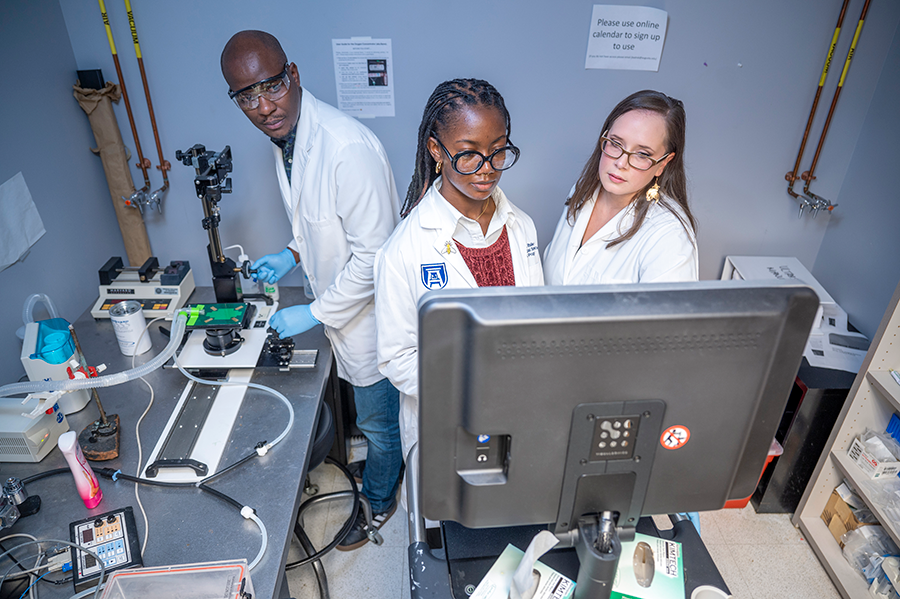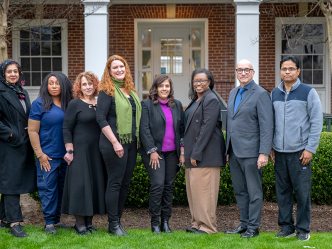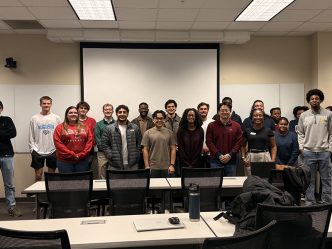This fall, the Biomedical Sciences PhD program in The Graduate School at Augusta University features the largest class in the program’s history, seeing a nearly 80% increase in the class size from fall 2023 to the start of the 2024-25 academic year.
Each of the 46 students will be engaged in research thanks to AU’s unique collaborations found on the Health Sciences campus between the Medical College of Georgia, Georgia Cancer Center, Dental College of Georgia, College of Allied Health Sciences and Wellstar MCG Health.
“Our biomedical sciences students are highly sought after upon the completion of our program,” said Interim Provost and The Graduate School Dean Jennifer C. Sullivan, PhD. “Our alumni are engaged in an array of careers, from tenured faculty at leading universities across the country to industry, not-for-profit agencies, the NIH, medical writing and more.”
AU’s Biomedical Sciences PhD Program is an umbrella program that encompasses a wide range of research pathways designed to train the next generation of research scientists. Students can select from one of nine highly-collaborative and interdisciplinary majors: cancer biology, cellular biology and anatomy, genomic medicine, molecular oncology and immunology, neuroscience, oral biology and maxillofacial pathology, pharmacology, physiology, and vascular biology.
Students gain valuable knowledge in research training, from cardiovascular disease, cancer and immunology to neurodegenerative diseases and sensory disorders. This allows students to explore their area of interest and develop new and innovative research insights.
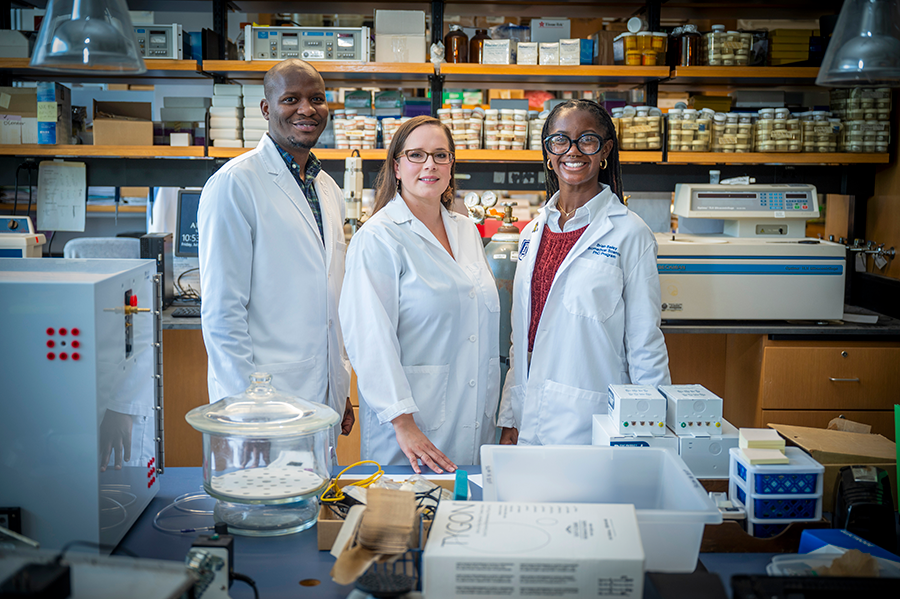
For some students, it’s a way to gain experience in fields of study they may not have considered before, opening them up to new opportunities and perhaps changing their career direction.
Desmond Moronge earned a Bachelor of Pharmacy degree from Kenyatta University and was working as a pharmacist in his home country of Kenya when he applied for the program. Now in his sixth year, he’s found a new interest in physiology.
“I thought pharmacology and toxicology involved drug discovery, so when I came in, I thought we’d be screening compounds and trying to come up with drugs, but then I was introduced to the concept of basic research and studying different pathways, which was something I never really thought of,” Moronge said.
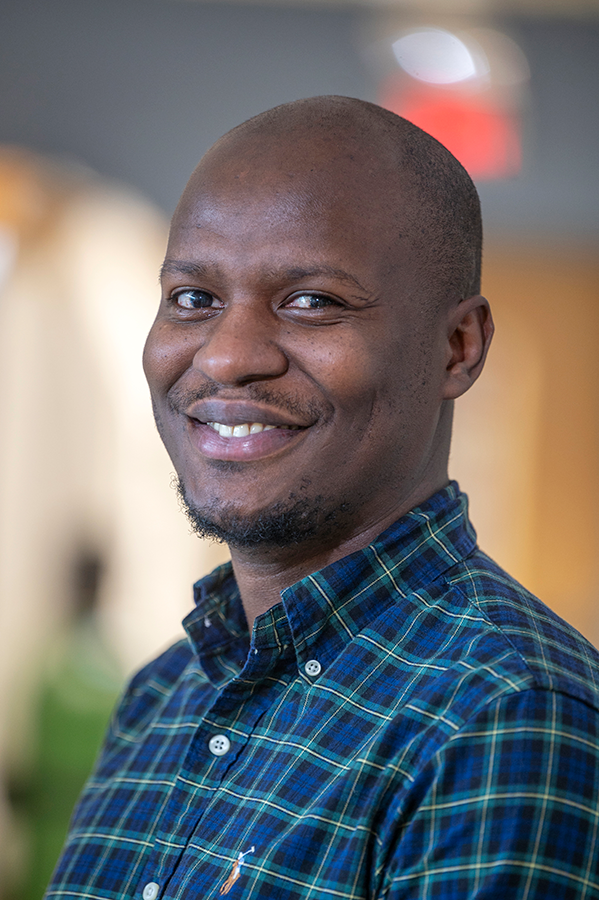
[Michael Holahan/Augusta University]
Through his research under mentor Jessica Faulkner, PhD, Moronge studies how different pathways result in adverse pregnancy complications, along with other projects. Faulkner’s lab studies women’s health and Moronge found himself working on a project studying acute kidney injury in young females, which has been conducted in collaboration with Sullivan’s lab.
“The conventional thinking is that women tend to be protected from acute kidney injury,” Moronge said. “While that’s true, and most studies have focused on men, what we are doing in our work is studying how females who’ve had a history of acute kidney injury go on to recover and then later in life when they become pregnant, the kidney injury comes back. We’re trying to understand how a history of acute kidney injury prior to pregnancy leads to adverse outcomes for both the mother and baby.”
Fellow sixth-year student Candee Barris wanted a program that would help her better understand the complexities of the human body.
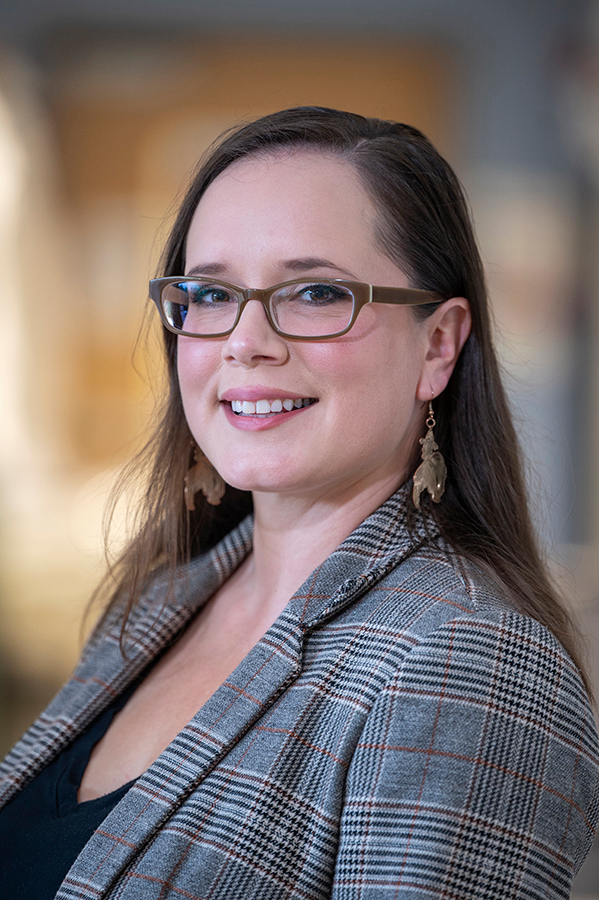
[Michael Holahan/Augusta University]
“I find the human body absolutely fascinating. People say, ‘Space is the final frontier,’ but no. We still know so little about our bodies and are learning more every single day about how they function,” Barris said.
Barris, a U.S. Army veteran and May 2019 graduate of the Biology program in AU’s College of Science and Mathematics, has been working with Eric J. Belin de Chantemèle, DSC, with the Vascular Biology Center. Under Belin de Chantemèle’s guidance, Barris has been studying the effects of obesity on hypertension and cardiovascular diseases in women.
“If you look at research, over 42% of the population is obese, which is the leading cause for hypertension, but obese men and women develop hypertension differently,” said Barris. “My studies have looked at the differences between how males and females develop obesity-associated hypertension, especially in females who were under-researched previously. I also investigate the contributions of sex hormones versus sex chromosomes.”
Barris said the collaborative environment found at AU, particularly through the relationship with Wellstar Health System, has positively impacted her research.
“Because of our collaboration with Wellstar MCG Health, we have been able to further drive the translational nature of our research, which is ultimately what we want. We endeavor to improve human health. This type of environment where we can collaborate and have those interactions is positively driving research,” said Barris.
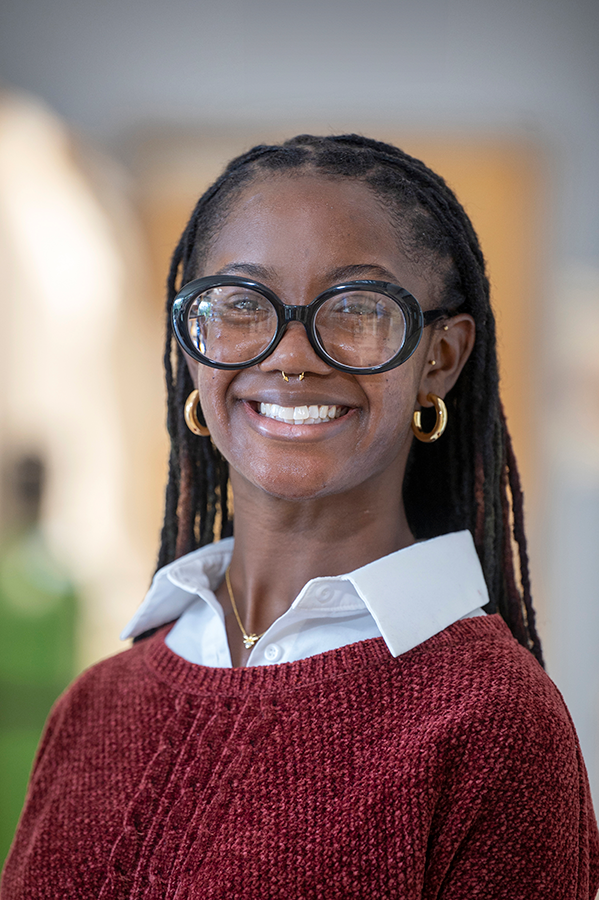
[Michael Holahan/Augusta University]
While Moronge and Barris are close to completing their studies in the program, second-year student Briah Bailey already boasts a strong resume that rivals other students further along in their research careers.
Bailey, who earned a Bachelor of Science in Biochemistry from Claflin University, credits her mentor, Menaka Thounaojam, PhD, and the program for affording her opportunities to be involved in research right from the start and for being able to attend multiple conferences in her first year of the program.
When the James and Jean Culver Vision Discovery Institute hosted a conference on the Summerville Campus earlier this year, Bailey participated and was awarded first prize for her three-minute data blaze presentation. It was her first time presenting in a setting of that magnitude, and while she was the only first-year student to present, she attributes how quickly she has been able to be involved with research to Thounaojam.
“Some of us had an opportunity to start rotations early before our academic year started last year, and Dr. Thounaojam really took me under her wing. She’s been teaching me what it means to balance being an active researcher as well as someone in academia, so I really appreciate her guidance.”
Bailey has already been awarded her first fellowship, the Doctoral Scholars Program fellowship through the Southern Regional Educational Board, in part due to her first-year experiences through her first year of the program.
“It’s a fellowship specifically promoting diversity in higher education for students who wish to pursue careers in academia,” said Bailey. “Dr. Pamela Martin, the current chair of the Department of Biomedical Sciences at Meharry Medical College, reached out to Dr. Thounaojam, and for my entire first year she worked to help me find ways to really improve my application.”
As Bailey looks ahead to what the program holds for her, she knows that the collaboration she and her classmates enjoy is what will ultimately set them up for success.
“The collaborative nature of AU has been so important in progressing our research and everything that we do. Each of our principal investigators work closely with each other, with other departments and with physicians in the hospital,” said Bailey. “It’s really special how everyone is intertwined within the department, outside the department, and with other departments, physicians and students.”
 Augusta University
Augusta University
